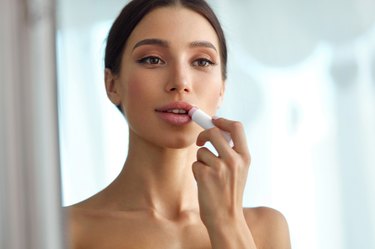
Beeswax can be confused with bee pollen and honey; all are produced by bees and are similar in their structure. However, beeswax is a unique substance and has several benefits to the human body.
Beeswax has no benefit when consumed directly because it is inert, but it can have other applications that are beneficial to your body.
Video of the Day
Video of the Day
Where Does Beeswax Come From?
Beeswax is produced from the glands of honeybees. The wax is produced by young bees and then scraped off their bodies, chewed and mixed with bee saliva as well as other enzymes.
After the bee chews and processes the wax, it attaches it to the honeycomb, where pollen is stored and bees reside. The wax also helps safely store honey produced by the bees, and it can help protect the hive from infections and other unwanted contaminants.
Related Reading
The Health Benefits of Beeswax
Beeswax has non-allergenic properties that can make it useful in protecting the skin from airborne allergens. It also provides slight anti-inflammatory and antioxidant qualities, which can benefit the body, according to a February 2020 paper in Molecules.
You may see beeswax as an ingredient in natural skincare products because it is gentle on sensitive skin and may provide other benefits.
1. Beeswax Can Moisturize and Protect the Skin
Beeswax has skin benefits because it's naturally moisturizing, so it's a common ingredient in skin salves and lip balms. The substance locks in moisture and can help keep the skin firm and plump, per the Molecules paper.
In some cases, beeswax may be applied to minor burns or other skin damage in order to help the skin heal. Beeswax can also be mixed with other products, such as honey and olive oil, to produce lotions and balms that can serve as natural treatments against eczema and psoriasis, per the Bastyr Center for Natural Health.
Acting as a surfactant, when beeswax is blended into cold creams and other skin lotions, it forms a protective barrier on the surface of the skin. This barrier, according to the Molecules paper, provides a film of protection against irritants while still allowing the skin to breathe.
This barrier may also help protect the tender skin on your lips. Using a lip balm that contains beeswax during cold weather might help reduce your chances of developing chapped lips.
Related Reading
2. Beeswax May Help Soften Skin
Dry, rough skin may benefit from creams, lotions or soaps that contain beeswax. When added to skincare products, beeswax is good for skin because it acts as an emollient and a humectant, drawing moisture to the skin and sealing it in, per the Molecules paper.
Beeswax also contains vitamin A, which may be beneficial in softening and rehydrating dry skin and in cell reconstruction.
3. Beeswax May Be an Especially Good Option for Sensitive Skin
People who have sensitive skin and are prone to allergic reactions may want to choose beeswax over other ingredients: An August 2018 study in the Journal of Drugs in Dermatology found that natural skincare products, including beeswax, were far superior for the management of sensitive skin than products with synthetic ingredients.
4. Beeswax May Help Soothe Common Skin Issues
People with common skin conditions including eczema and psoriasis have found relief with help from beeswax. An older January 2005 study in Archives of Medical Research revealed that a mixture of honey, beeswax and olive oil could help calm common skin flare-ups, as well as slow the growth of fungal and bacterial infections.
Is Beeswax Edible?
Many people choose to eat beeswax (directly, as honeycomb, or indirectly, as an ingredient in processed foods) for health benefits. These perks include relieving pain, lowering cholesterol, reducing swelling and as a treatment for ulcers, hiccups and diarrhea. However, there's little research to show that it's effective for any of these conditions.
Also, eating too much beeswax can be dangerous, according to the U.S. National Library of Medicine: For instance, swallowing large amounts of honeycomb daily can cause a blockage in the intestines. If you or someone else has eaten a large amount of beeswax, call poison control.
- Bastyr Center: "Bastyr University’s Living Naturally Series: Herbal Holiday Gift Making"
- Journal of Drugs in Dermatology: "Evaluation of the Performance of a Nature-Based Sensitive Skin Regimen in Subjects With Clinically Diagnosed Sensitive Skin"
- Archives of Medical Research: "Mixture of honey, beeswax and olive oil inhibits growth of Staphylococcus aureus and Candida albicans"
- Molecules: "Bee Products in Dermatology and Skin Care"
- U.S. National Library of Medicine: "Beeswax poisoning"
Is this an emergency? If you are experiencing serious medical symptoms, please see the National Library of Medicine’s list of signs you need emergency medical attention or call 911.